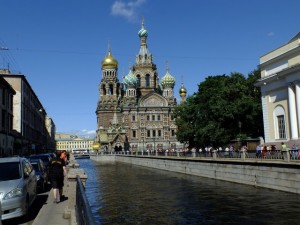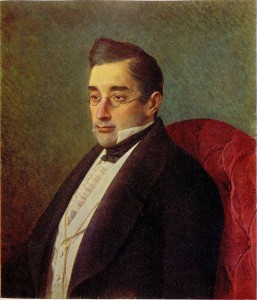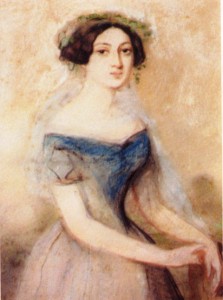Winding past the Cathedral on the Spilt Blood, Kazansky Cathedral, the Singer Building with Dom Knigi, towards Sennaya Ploschad and the Fontanka River is Griboedov Canal. Thanks to the magnificence of the buildings lining the canal, it is one of the most photographed waterways in St. Petersburg – and one of the least considered. The name however is a fitting monument to one of Russia’s greatest writers who established the tradition of romantic writers fighting duels and dying young.
Alexandr Griboedov (1795-1829) was born in Moscow. His father was a retired military officer and a writer. Griboedov learnt English, French, German, Italian, Latin and Ancient Greek as a child and studied law, then physics and mathematics at Moscow State University. In 1812 took up a commission with the hussars but illness prevented him from joining his unit during the War of 1812. In 1814 Griboedov published his first literary works including Young Spouses. Resigning from the hussars in 1817, he joined the College of Foreign Affairs, initially working as secretary, then as translator. Young and overly intelligent the diplomat soon got in trouble over a ballerina he invited home “for a cup of tea”.
The ballerina, Advotya Istomina, had recently argued with her lover, Vasily Sheremetov, one of Griboedov’s associates and an officer in the Cavalry Guards. As a result of the invitation to have a cup of tea she ended up staying with Griboedov two days. Griboedov himself was sharing an apartment with his friend Alexandr Zavodsky, who was known to be in love with Istomina. Sheremetov perceived this as betrayal of the worst degree and challenged both Zavodsky and Griboedov to a duel. He would fight Zavodsky while his second would fight Griboedov. The parties agreed to fire at six paces – terms that substantially increased the risk of death. Sheremetov fired and hit either Zavodsky’s coat or cap (accounts vary). Zavodsky then announced that he saw no reason to fire at his opponent and would shoot at his legs in order to satisfy honour and end the duel with little or no bloodshed. Sheremetov answered that this was unsatisfactory and whether the duel was completed or not, he would kill Zavodsky. Zavodsky responded by shooting Sheremetov in the stomach, a wound which proved fatal. The moral being never threaten to kill someone when they have a loaded gun pointed at you.
However, due to the fatality, Griboedov, who had yet to fight completed the duel a year later in Tiflis (now Tbilisi, Georgia) where he and his opponent, Cavalry Ensign Yakobovich, happened to be located on service. Although neither men wanted to kill each other, having studied together at school, Griboedov was wounded on his left hand. This prolonged duel, however, had a strong impact on Griboedov and was reflected in his writing.
Having turned down a post to America, Griboedov was sent to Persia where he achieved the release of Russian prisoners of war. In 1823 the diplomat left the service for a couple of years and devoted himself to literary work, and completed his most famous work Woe from Wit (Gore ot uma) in 1824 – although the play was only published in excerpts as it fell foul of the censor for its criticism of despotism and serfdom. The play is a satire of Russian aristocratic life and many of the lines became commonly quoted.
In 1825, Griboedov returned to diplomatic service in Tiflis and spent time studying Arabic, Farsi, Turkish and Georgian. However his writings portrayed dangerously progressive views and in January 1826, he was arrested under suspicion of being involved in the Decembrist Uprising. Returning to service in September 1826 he participated in negotiations which led to the Treaty of Turkmenchay (1828) and delivered the signed document to St. Petersburg. Being made ambassador to Persia, he returned to Tiflis where he married the young and beautiful Nina Chavchavadze.
Shortly after Griboedov’s arrival in Persia, an Armenian eunuch and two Armenian girls escaped from the harem of Shah Fath Ali Shah and sought refuge with the Russian legation. According to the recently signed treaty, Armenians living in Persia were to be free to return to Eastern Armenia. The Shah demanded the return of his slaves and Griboedov refused, citing the terms of the Treaty of Turkmenchay. His refusal caused outrage and the building where the legation was housed was surrounded by a mob. The Bolshaya Sovetskaya Entsiklopediya (Great Soviet Encyclopaedia) states that British agents were involved in inciting a mob but it is clear that the Treaty of Turkmenchay was resented and there was strong anti-Russian feeling in Persia at the time. The mob, spurred on by mullahs, demanded the release of the three refugees. Griboedov initially refused, then eventually conceded but by that time it was too late. The mob attacked the building. A Cossack detachment held the mob at bay for over an hour before being driven back to Griboedov’s office. Here the legation again held the mob until it broke through the roof and ceiling. Griboedov died dressed in full uniform and fighting with his sword. His body was decapitated and dragged through the streets. He was later identified by the duelling scar on his left hand. His 16 year old wife Nina remained faithful to his memory and died 28 years later of cholera during a cholera epidemic – it is said that she spent her days helping the ill and made no attempt to avoid infection herself.
This is an extended article of what was first published by The St. Petersburg Times on 14 May 2014.
Be sure to like Intrepid Adventure on Facebook and check out Peter Campbell’s latest books on Amazon.com.
Copyright © Peter Campbell 2014, www.intrepid-adventure.com






